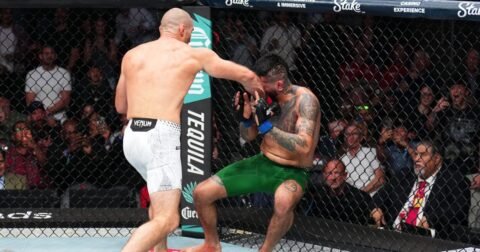It seems to be happening nearly every other event that there is an issue with a fighter making weight. Early weigh-ins which have been thought to have been a benefit for fighters as they give the fighters a little longer to recover after the weight cut may not be doing quite what was originally intended.
In the 18 months leading up to the implementation of the early weigh-ins for MMA, a total of 17 fighter missed weight for UFC bouts.
In the 18 months since: 51 fighters have missed weight or failed to weigh in for UFC bouts.
— Mike Bohn (@MikeBohn) January 13, 2018
We only need to look back as far as this past weekend where there was a number of weight issues. Of course, I’m talking about Darren Till who missed weight by 3.5 pounds (174.5lbs) but also Molly McCann who came in a pound over the agreed limit (127). What is drawing attention to the scale based problems is the way in which the fighters perform after missing weight. Fighters who have missed weight are a combined 7-1 in the eight bouts fought in 2018 with McCann being the only fighter to buck the winning trend thus far. With four of the winning fighters coming in as the betting underdog in their respective fights it has begun to draw a heavy albeit fair dose of scepticism about how hard the fighters are trying to make weight and if missing weight is in some ways an underhanded strategy for success. This developing trend, however, is not something that has any roots in data with fighters who have missed weight in 2017 and 2016 holding a less than impressive combined record of 20-20.
The whole issue raises several questions for which have as yet not been concisely answered. Should something be done to even the odds, so the fighters making weight are not at a perceived disadvantage against what is thought to be a heavier less dehydrated opponent? This can be taken to mean compensated but also to make the fight more evenly balanced. The overarching question remains, taking into consideration the number of fighters that miss weight every year, should something be done to address the idea of weight cutting as a whole?
In answer to the first question, we can answer with reference to the UFC Liverpool issues. In terms of financial compensation for the fighter to make weight Stephen “Wonderboy” Thompson received 30% of Till’s purse in order for the fight to take place. This is a fairly standard protocol with a fighter giving up a minimum of 20% if they miss weight. To his credit Till stated that he offered 100% of his purse as long as the fight went ahead, talk about a hometown hero. Further stipulations were also placed on the bout with Till having to re-weight on the morning of the fight at under 188 lbs. Although this might seem quite a good bit heavier than the 170 lbs weight class it is not uncommon for fighters to lose 10% body weight during a cut with Till cutting considerably more (perhaps a reason for his multiple weight infractions) with speculations of having a walk around weight of anywhere between 200 – 210 lbs. The thought process behind this being Till would have to remain cutting longer and not be able to fully recover to his normal size by the time of the fight, therefore, negating any perceived benefit from the initial weight difference.
Despite this financial setback and the increased toll in the body from an extended cut it still seems as though the most important thing in MMA is the record and Till gets to add one more mark to the W column. What I personally found interesting in this specific case is when the question about being in the running for a title shot Till shot down the idea of being the most deserving as he did not make weight, not the type of honest that is usually seen in such an inherently individual sport.
There has of course been a fair amount of criticism of fighters that have missed weight with Till taking his air share, especially from fellow welterweight and known loudmouth Colby Covington whos Twitter is always good for a bit of a laugh and sometimes a cringe.
I guess if you ain't cheating you ain't trying right Darrell? @darrentill2 You fat fuck. Back of the line junior 🦍. #UFCLiverpool #NerdBash2018 #makewelterweightgreatagain pic.twitter.com/jn6hLsyddn
— Colby Covington (@ColbyCovMMA) May 26, 2018
Other names that seem to have an issue with fighters coming in overweight include Dominick Cruz and former fighter Chael Sonnen who both suggest that coming in grossly overweight as in the case of Mackenzie Dern (who weighed in at 123lbs, 8 lbs over the 115 weight class) in her last bout earlier this month. Cruz suggests that coming in at the weight that Dern did it is “creating yourself an advantage to win” and links that with blatant cheating point agreed on by Sonnen.
"When you come in with that big of a weight advantage… it's basically cheating in my opinion." – Dominick Cruz on Mackenzie Dern. pic.twitter.com/sONQ5Qs4lt
— FOX Sports: UFC (@UFCONFOX) May 13, 2018
Sonnen takes this idea further and suggests that the UFC should count any case of a missed weight as a forfeit that would go down as a loss on the record of the fighter that missed. An idea that he has taken from the world of freestyle wrestling in which he is very knowledgeable. This would be a very hard line step for any organisation to take but Sonnen believes it would only happen once or twice before fighters stopped missing weight altogether.
A more sustainable and perhaps all round better option would be the introduction of additional weight classes as in boxing or a more thorough weigh-in procedure similar to that of ONE Championship. The idea of the ONE Championship weigh in procedure, which takes place throughout the week of the fight and measures fighters hydration levels is to promote a fighter to fight at there walk around weight and not have to undergo a drastic dehydration in order to make weight.
All in all, there is definitely an issue with the weight that needs to be addressed by the UFC in ONE way or another (see what I did there). It may be by implementing a radically different weigh-in procedure or by issuing a stricter forfeiture policy for fighters that grossly miss weight. In any case, I believe the sooner something is changed the better so we can get rid of the ifs and buts that always surround these controversial issues of the day before and get back to the actually important stuff, the night of the fight itself.







